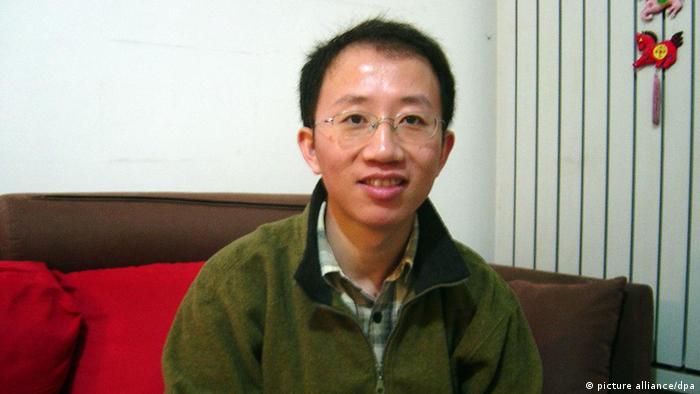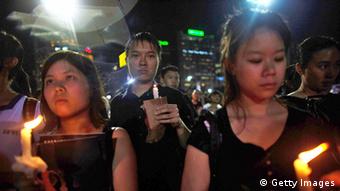發起六四「重返天安門」的北京維權人士胡佳,今天(30日)下午在自己的《推特》(twitter)寫道:「監獄之門再次向我打開」,他不能與家人過端午了。
胡佳下午5時許在網上留言,「媽媽,爸爸,金燕,寶寶,我愛你們。這個端午節我不能陪伴你們了。監獄的門再次向我打開了,為了自由,我別無選擇。」金燕是指曾金燕,是胡佳的妻子,她目前居住在香港,在香港大學讀書。
1 小時後,胡佳再留言,「77歲的媽媽哭着打來電話:『胡佳,媽媽愛你!保重自己。生命是可貴的。一定要活下去,不管環境多惡劣。我們都要活下去。我們等著 你。』我明白她要表達的意思。我給花草們澆足了水,收拾了一些換洗衣服。在家裏靜等了。門外一片寂靜。國保來吧,共產黨來吧。我在這裏。」晚上7時又留言 說:「還是母親心細,又來電話提醒我帶好治療肝硬化的藥物。儘管看守所通常是不讓帶外面的藥物進入。我在等著有警察來敲門。6月4日那天我會穿著當下這件 衣服,我的心一定重回天安門。」
胡佳今日下午接受訪問期間突然接獲家人來電,他隨後表示,自己快將被捕。胡佳在網上推動「重返天安門」行動,表示今年六四將穿上「和平佔中」黑衣,到天安門悼念,即使一槍把他擊斃他都堅持要去天安門。這幾個月以來,胡佳一直估計當局會逮捕他。(於慶中/綜合外電報導)
天安門事件25年ハンストリレー 元学生リーダーら胡佳下午5時許在網上留言,「媽媽,爸爸,金燕,寶寶,我愛你們。這個端午節我不能陪伴你們了。監獄的門再次向我打開了,為了自由,我別無選擇。」金燕是指曾金燕,是胡佳的妻子,她目前居住在香港,在香港大學讀書。
1 小時後,胡佳再留言,「77歲的媽媽哭着打來電話:『胡佳,媽媽愛你!保重自己。生命是可貴的。一定要活下去,不管環境多惡劣。我們都要活下去。我們等著 你。』我明白她要表達的意思。我給花草們澆足了水,收拾了一些換洗衣服。在家裏靜等了。門外一片寂靜。國保來吧,共產黨來吧。我在這裏。」晚上7時又留言 說:「還是母親心細,又來電話提醒我帶好治療肝硬化的藥物。儘管看守所通常是不讓帶外面的藥物進入。我在等著有警察來敲門。6月4日那天我會穿著當下這件 衣服,我的心一定重回天安門。」
胡佳今日下午接受訪問期間突然接獲家人來電,他隨後表示,自己快將被捕。胡佳在網上推動「重返天安門」行動,表示今年六四將穿上「和平佔中」黑衣,到天安門悼念,即使一槍把他擊斃他都堅持要去天安門。這幾個月以來,胡佳一直估計當局會逮捕他。(於慶中/綜合外電報導)
(01/03 21:37)【台北共同】1989年の天安門事件で武力弾圧された民主化運動の学生リーダー、王丹氏(台湾在住)らが事件から25年となる6月4日に向け、24時間ごとのハンストをリレー形式で実施し事件への抗議を示す活動を元日から始めた。王氏が3日に明らかにした。
王氏によると1日午前0時(日本時間同1時)から、台北で王氏、北京で中国の人権活動家胡佳氏、ニューヨークで中国系画家がそれぞれ24時間のハンストを同時に実施し活動をスタートさせた。この活動が、中国の人権改善を訴える世界の人々にどの程度広がるか注目される。
 王丹氏
王丹氏"风险恰恰证明对抗的价值"
为了历史不被完全遗忘,当年六四学运领袖发起全球接力绝食活动。首棒参与者是王丹、胡佳和薛明德。
(德国之声中文网)2014年也是中国"六四"民主运动被镇压25周年纪念。新年伊始,当年学运领袖以及民主运动的倡导者发起"天下围城"的
全球接力绝食活动
。参加者每天从零点到24点绝食一整天。元月1日,作为第一棒,89学运领袖王丹在台北、人权活动家胡佳在北京以及画家薛明德在纽约开始绝食。
作为"天下围城"行动的组成部分,这项接力绝食活动将持续半年。每个参与绝食活动的志愿者都会在事后以各种方式留下绝食感言以及相关照片。王丹不仅率先绝食,也是该活动的发言人之一。他在自己的网站上写道:
"新年第一天,与北京的胡佳,纽约的薛明德一起,进行第一棒的全球接力绝食,拉开为期半年的六四25周年纪念活动'天下围城'的序幕。现在已经超过13个 小时。我并不认为这样的行动就能直接导致六四问题的解决,那个还需要更多的努力;但是我们做事情,很多时候不是为了别人,而是为了自己,自己的坚持,自己 的努力。大家都努力面对自己的良知,他人的事情,社会的事情才能够解决。新年第一天,我在绝食,但是我很满足。"
王丹网站还报道,参加绝食第一棒的薛明德在绝食后,将在纽约时代广场举行行为艺术表演。
为了历史不被遗忘
89学运期间最著名的事件之一是抗议大学生在天安门广场进行了绝食。当年15岁的中学生胡佳虽然没有直接参与大学生的示威活动,但他对当年军车坦克的横冲直撞记忆犹新。这名2008年的欧洲议会 萨哈罗夫人权奖获得者 萨哈罗夫人权奖获得者对德国之声表示,这回他们以绝食这种与当年相似的手段重现历史状态与人们的诉求:
"尤其在当前,当局希望这段历史从人们的记忆中抹去,完全隐秘屠城的罪行。正是这个时候,我们以当年的方式唤起人们的记忆,让80、90后一代能够知晓这段历史。"
"天下围城"挑战中共
胡佳不认为中共有资格平凡六四。他说,"共产党当年的直接责任者应该在历史的审判台上,被追究政治责任和法律责任,他们应该面对反人类罪的控告。"胡佳表示,唯有这样,才能 最终解决六四问题。
他说,从这个意义上说,"天下围城"是海内外民众对中共的挑战行动。胡佳虽然不是本次活动的组织者,参与者身份的他会在国内承担起更多责任,担当更大风 险。胡佳非常清楚这一点。2006年因为组织发起维权抗暴绝食,他曾被强迫"失踪"了41天。面对这样的风险,胡佳说,"现实的风险自然存在。但风险的存 在恰恰证明这种对抗是有价值的。"
作者:李鱼
责编:石涛
作为"天下围城"行动的组成部分,这项接力绝食活动将持续半年。每个参与绝食活动的志愿者都会在事后以各种方式留下绝食感言以及相关照片。王丹不仅率先绝食,也是该活动的发言人之一。他在自己的网站上写道:
"新年第一天,与北京的胡佳,纽约的薛明德一起,进行第一棒的全球接力绝食,拉开为期半年的六四25周年纪念活动'天下围城'的序幕。现在已经超过13个 小时。我并不认为这样的行动就能直接导致六四问题的解决,那个还需要更多的努力;但是我们做事情,很多时候不是为了别人,而是为了自己,自己的坚持,自己 的努力。大家都努力面对自己的良知,他人的事情,社会的事情才能够解决。新年第一天,我在绝食,但是我很满足。"
王丹网站还报道,参加绝食第一棒的薛明德在绝食后,将在纽约时代广场举行行为艺术表演。
为了历史不被遗忘
89学运期间最著名的事件之一是抗议大学生在天安门广场进行了绝食。当年15岁的中学生胡佳虽然没有直接参与大学生的示威活动,但他对当年军车坦克的横冲直撞记忆犹新。这名2008年的欧洲议会 萨哈罗夫人权奖获得者 萨哈罗夫人权奖获得者对德国之声表示,这回他们以绝食这种与当年相似的手段重现历史状态与人们的诉求:
"尤其在当前,当局希望这段历史从人们的记忆中抹去,完全隐秘屠城的罪行。正是这个时候,我们以当年的方式唤起人们的记忆,让80、90后一代能够知晓这段历史。"
"天下围城"挑战中共
胡佳不认为中共有资格平凡六四。他说,"共产党当年的直接责任者应该在历史的审判台上,被追究政治责任和法律责任,他们应该面对反人类罪的控告。"胡佳表示,唯有这样,才能 最终解决六四问题。
他说,从这个意义上说,"天下围城"是海内外民众对中共的挑战行动。胡佳虽然不是本次活动的组织者,参与者身份的他会在国内承担起更多责任,担当更大风 险。胡佳非常清楚这一点。2006年因为组织发起维权抗暴绝食,他曾被强迫"失踪"了41天。面对这样的风险,胡佳说,"现实的风险自然存在。但风险的存 在恰恰证明这种对抗是有价值的。"
作者:李鱼
责编:石涛

|
By CHRIS BUCKLEY
Xu Zhiyong, who was held Tuesday
on unlawful-assembly charges, has challenged the Communist Party to act
on its vows to expose corruption and respect the rule of law.
Chinese lawyer Xu Zhiyong arrested
The Guardian - 1 day ago
Human rights campaigner reportedly held at Beijing jail on suspicion of gathering people to disturb public order.
Xu Zhiyong - Wikipedia, the free encyclopedia
en.wikipedia.org/wiki/Xu_Zhiyong
Xu Zhiyong
(Chinese: 许志永; pinyin: Xǔ Zhìyǒng) is a lecturer at the Beijing
University of Post and Telecommunications. He was one of the founders of
the NGO ...歐洲議會不顧中國的警告,昨天給系獄的中國人權異議者胡佳頒授薩哈羅夫人權獎,在亞歐首腦會議舉行前夕,引起了中國的強烈抗議。
《泰晤士報》說,胡佳因為推動對愛滋病者、環境問題和西藏自決等方面的關注而獲得薩哈羅夫獎。
該報援引中國外交部發言人劉建超說,這是悍然干涉中國內政。不過,他後來又說,這起事件將不影響今天舉行的亞歐首腦會議。出席首腦會議的歐洲領袖包括法國總統薩爾科齊,歐盟委員會主席巴羅佐等,會議討論的議題包括二氧化碳排放目標和改革全球金融體制等等。
《國際先驅論壇報》說,去年,胡佳通過視頻聯繫在歐洲議會作證,講述中國的人權問題。幾個星期之後,胡佳被捕,後來被判顛覆政權罪名成立,入獄三年半。
中國異議人士胡佳獲薩哈羅夫獎

胡佳曾通過電話向歐洲議會作証
|
歐洲議會綠黨團體發表聲明說,把薩哈羅夫獎授予胡佳切實地反應了這個獎項的精神,也就是支持自由的思想,獎勵反對壓迫的人權保衛者。
聲明還說,中國在舉辦北京奧運會前作出的改善人權狀況的承諾沒有得到落實。
中國外交部發言人秦剛在北京發表談話說,中國在人權問題上的立場明確,反對以人權問題干涉別國內政。秦剛還說,把人權獎頒給一個罪犯,是對中國司法主權的干涉,也是對人權的不尊重。
胡佳一直致力于在中國維護民權,保護環境和維護愛滋病毒感染者權益的活動。他在去年通過電話向歐洲議會人權委員會就中國的人權狀況提供証詞,之后遭到逮捕,并被以顛覆罪判處三年半監禁,目前仍在獄中。
歐洲議員表示,中國政府一直在竭力阻撓歐洲議會把薩哈羅夫獎授予胡佳。歐洲議會自由派團體議員沃森說,中國官員通過信件、電子郵件、甚至電話,試圖阻止向胡佳授獎。
薩哈羅夫獎是以前蘇聯著名異議人士薩哈羅夫命名的,獲獎者一般會應邀在12月份出席頒獎儀式。
Chinese Activist Wins Rights Prize
BEIJING — Hu Jia, a soft-spoken, bespectacled advocate for democracy and human rights in China, was awarded the Sakharov Prize for Freedom of Thought, Europe’s most prestigious human rights prize, on Thursday. The award was a pointed rebuke of China’s ruling Communist Party that came as European leaders were arriving in Beijing for a weekend summit meeting.
Mr. Hu, 35, was given the prize by the European Parliament despite warnings from Beijing that his selection would harm relations with the European Union.
Last year, Mr. Hu testified via video link before a hearing of the European Parliament about China’s human rights situation. Weeks later, Mr. Hu was jailed and later sentenced to three and a half years in prison on a conviction for subversion based on his critical writings about Communist Party rule.
Mr. Hu has been one of China’s leading figures on a range of human rights issues, while also speaking out on behalf of AIDS patients and for environmental protection. The European award comes after he had been considered a frontrunner for the Nobel Peace Prize, only to lose to the former president of Finland, Martti Ahtisaari.
“Hu Jia is one of the real defenders of human rights in the People’s Republic of China,” said the president of the European Parliament, Hans-Gert Pöttering. “The European Parliament is sending out a signal of clear support to all those who support human rights in China.”
The timing may make for a frosty weekend in Beijing where European leaders are to meet with top Chinese officials at the Asia-Europe summit meeting, held every two years. This year, the global financial crisis is expected to dominate, and cooperation will be high on the agenda.
In Beijing on Thursday, José Manuel Barroso, the European Commission president, called for “unprecedented levels of global coordination.”
"It’s very simple: We swim together, or we sink together," he said in comments reported by The Associated Press.
Behind the scenes, China had lobbied against Mr. Hu’s candidacy for the Sakharov Prize. Song Zhe, the Chinese ambassador to the European Union, wrote a critical Oct. 16 letter to the president of the European Parliament.
“If the European Parliament should award this prize to Hu Jia, that would inevitably hurt the Chinese people once again and bring serious damage to China-E.U. relations,” Mr. Song wrote, according to The Associated Press.
China had also warned against awarding Mr. Hu the Nobel Peace Prize, and Foreign Ministry spokesman Qin Gang had described him in scathing terms as a convicted criminal.
“The Chinese government will be upset,” said Teng Biao, a legal expert who has co-written essays with Mr. Hu. “But as a responsible nation that is trying to integrate into the international community, China has to understand that its conduct should follow international protocols. It should embrace the criticism as an opportunity to improve China’s human rights condition.”
Mr. Hu remains imprisoned in Beijing and could not be reached for comment. His wife, Zeng Jinyan, a prominent blogger and human rights activist, also could not be contacted. She has lived for months under house arrest with the couple’s infant daughter.
The award to Mr. Hu is an embarrassment for the Communist Party less than two months after China’s successful staging of the Olympic Games. During the Olympics, the Chinese government proved it could smoothly manage the world’s biggest sporting event, but the government also prevented demonstrations at designated protest zones, instituted broad censorship restrictions on the domestic media and placed numerous dissidents under house arrest or surveillance.
Mr. Hu’s conviction in April was part of a nationwide crackdown against dissidents in what many human rights advocates considered a pre-Olympic silencing campaign. A devout Buddhist, Mr. Hu has dedicated himself to a range of issues during the past 12 years, including environmental protection, helping AIDS sufferers, championing the legal rights of Chinese citizens and promoting greater democracy.
He also used a personal Web site and e-mail to become a one-man clearinghouse of information on human rights abuses and other controversies that officials preferred to keep quiet.
“Whatever he does, he always stands in the forefront,” Mr. Teng said in an earlier interview. “Everything he wrote, everything he said, is straight from his heart. We have poor people and marginalized people in society whose voices are being muzzled. Hu Jia was trying to be the spokesman for the unheard voices.”
Mr. Hu graduated from Beijing’s Capital University of Economics and Trade in 1996 and almost immediately plunged into China’s nascent civil society. He traveled to Inner Mongolia to plant trees as a measure to slow the advance of the Gobi Desert.
By 2000, China was facing the rapid spread of AIDS, a problem the government had initially denied and remained reluctant to publicly confront. Mr. Hu formed a non-governmental organization, Loving Source, and focused on caring for people infected by AIDS in a blood-selling scandal in Henan Province.
Gao Yaojie, a prominent AIDS activist in China, recalled how Mr. Hu once rode a bicycle down a rutted dirt road to reach an isolated village decimated by AIDS. The road became narrower and potted with holes until Mr. Hu simply put the bike on his shoulder and walked to deliver help to a village where local officials where trying to cover up the problem.
“We didn’t do anything wrong,” Dr. Gao said, in an interview earlier this month. “The only thing we did was to help H.I.V.-positive people. But we were always under great pressure from the government.”
Mr. Hu later began joining Internet petition campaigns calling for the release of political prisoners, while also calling on authorities to uphold the legal rights of citizens written in the Chinese Constitution.
His activism quickly made him a target. In 2006, he spent 168 days under house arrest. Rather than disappear from public view, Mr. Hu produced a documentary, “Prisoners in Freedom City,” which includes his footage of state security agents harassing his wife as she tried to leave their apartment complex, which is known as Bo Bo Freedom City.
Indeed, as Mr. Hu faced constant surveillance and harassment — he once was taken away for 41 days — he continued to use the Internet to push for political reform and publicize human rights abuses. His testimony via video link before the European parliamentary committee came last November.
“It is ironic that one of the people in charge of organizing the Olympic Games is the head of the Bureau of Public Security, which is responsible for so many human rights violations,” he testified. “It is very serious that the official promises are not being kept before the Games.”
Huang Yuanxi contributed research.





沒有留言:
張貼留言